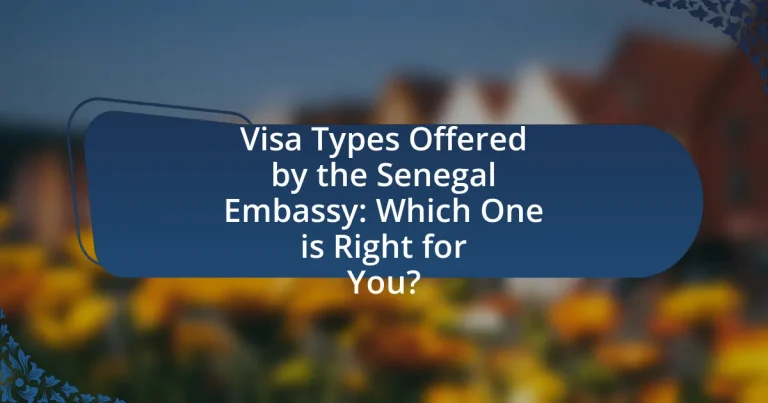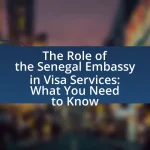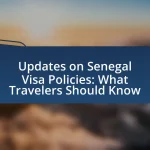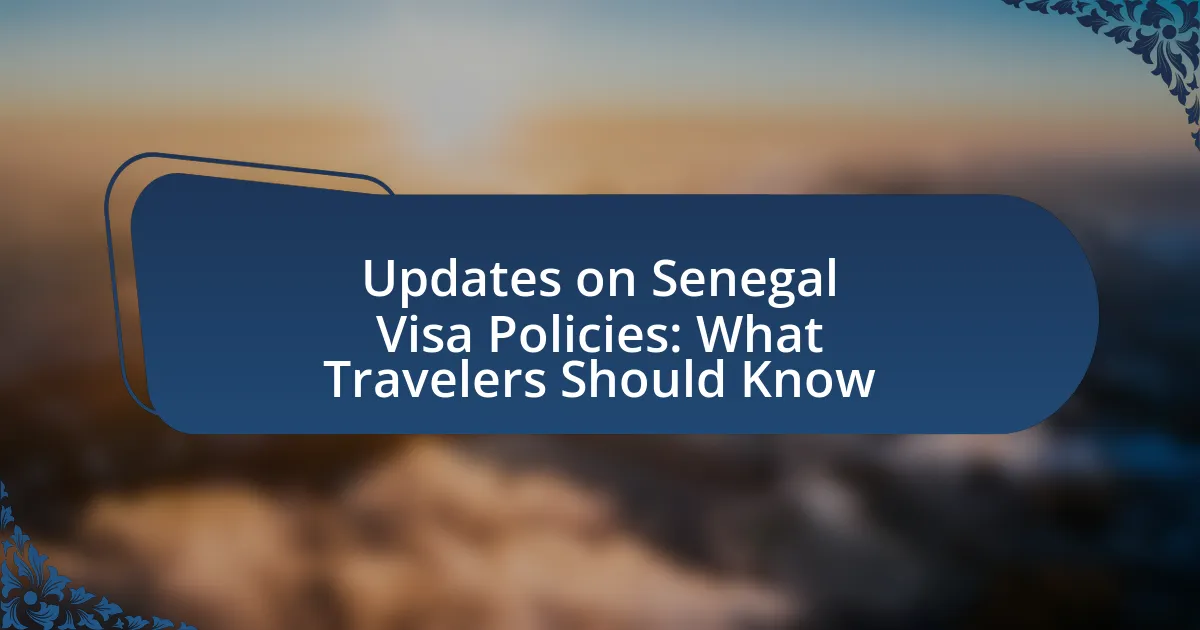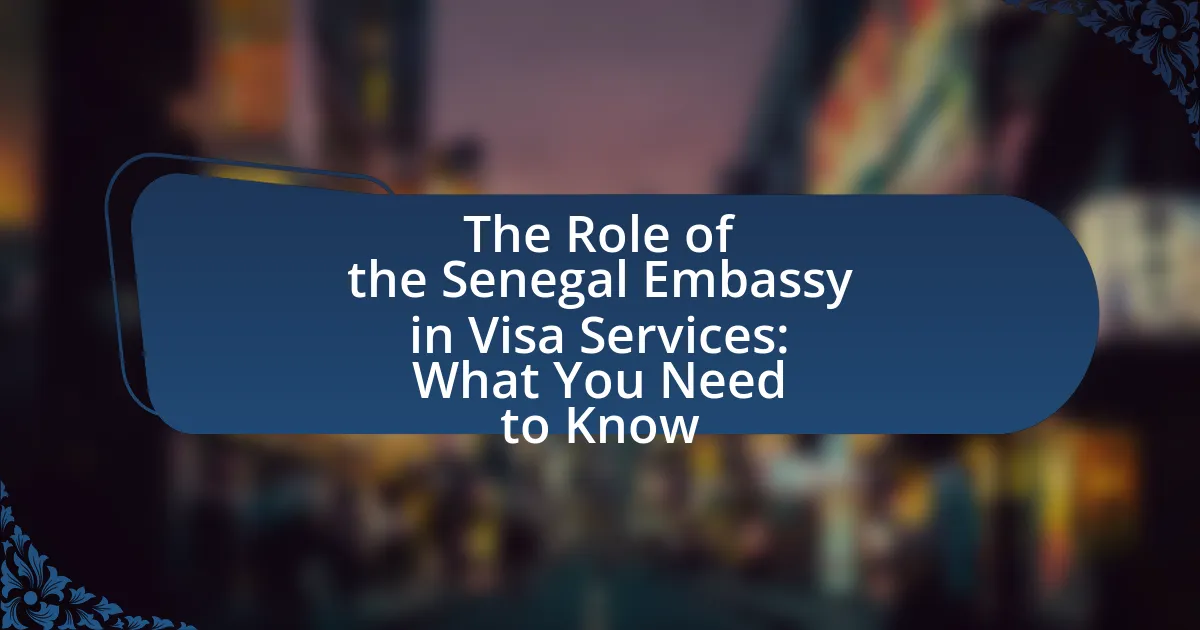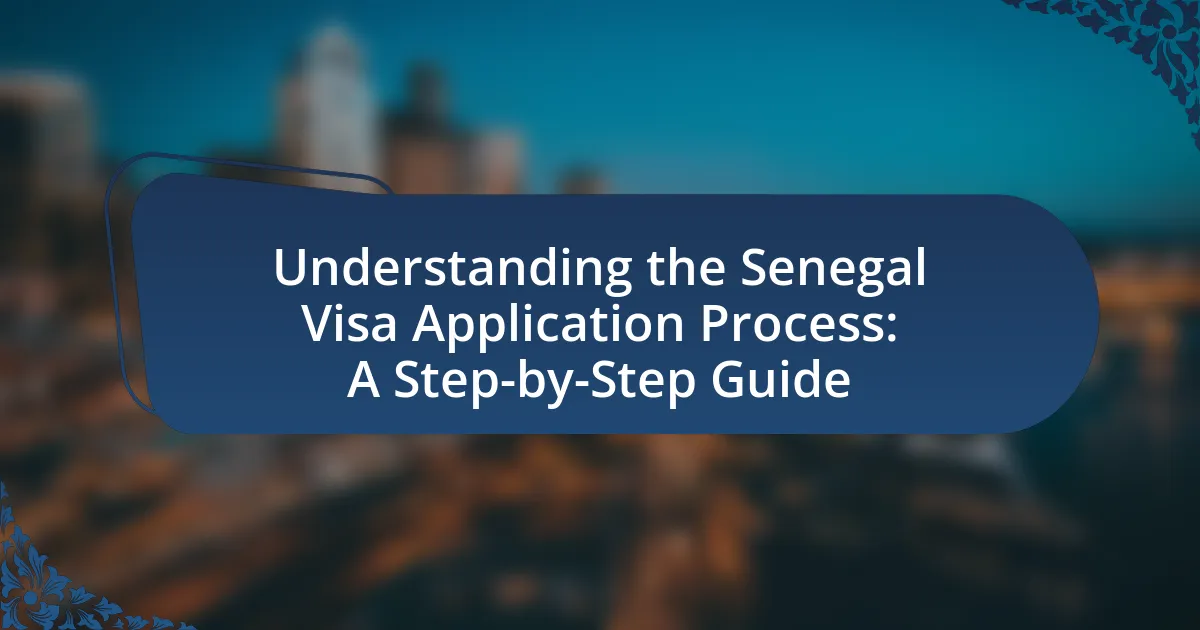The article focuses on the various visa types offered by the Senegal Embassy, including tourist, business, student, work, transit, and diplomatic visas. It outlines the specific purposes of each visa category, the requirements for application, and the factors to consider when selecting the appropriate visa type based on travel intentions. Additionally, the article addresses common challenges faced during the application process, tips for ensuring a successful application, and resources available for assistance. By understanding these elements, travelers can navigate Senegal’s visa system effectively and comply with immigration regulations.

What are the different visa types offered by the Senegal Embassy?
The Senegal Embassy offers several visa types, including tourist visas, business visas, student visas, and transit visas. Each visa type serves a specific purpose: tourist visas are for leisure travel, business visas are for professional activities, student visas are for educational pursuits, and transit visas facilitate travel through Senegal to another destination. These classifications are established to accommodate various travel needs and ensure compliance with Senegalese immigration regulations.
How do I determine which visa type is suitable for my needs?
To determine which visa type is suitable for your needs, first assess the purpose of your travel to Senegal, such as tourism, business, study, or family visit. Each visa type corresponds to specific activities; for instance, a tourist visa is for leisure travel, while a business visa is intended for professional engagements. Additionally, review the requirements and conditions associated with each visa category on the Senegal Embassy’s official website, as this will provide clarity on eligibility and documentation needed. Understanding these factors ensures you select the appropriate visa that aligns with your travel intentions.
What factors should I consider when choosing a visa type?
When choosing a visa type, consider the purpose of your travel, duration of stay, and eligibility requirements. The purpose of travel dictates whether you need a tourist, business, student, or other specific visa types. The duration of stay influences whether you require a short-term or long-term visa. Eligibility requirements vary by visa type and may include documentation, financial proof, or sponsorship. Understanding these factors ensures compliance with immigration laws and facilitates a smoother application process.
How does my purpose of travel influence my visa choice?
Your purpose of travel directly influences your visa choice by determining the specific type of visa you need to apply for. For instance, if you are traveling for tourism, you would require a tourist visa, whereas if your purpose is business-related, a business visa would be necessary. Each visa type has distinct requirements and conditions that align with the traveler’s intent, such as duration of stay, activities permitted, and documentation needed. Therefore, understanding your travel purpose is essential in selecting the appropriate visa to ensure compliance with immigration regulations.
What are the specific categories of visas available?
The specific categories of visas available include tourist visas, business visas, student visas, work visas, transit visas, and diplomatic visas. Each category serves distinct purposes: tourist visas allow for leisure travel, business visas facilitate commercial activities, student visas are for educational pursuits, work visas permit employment, transit visas are for passing through the country, and diplomatic visas are designated for government officials. These categories are established by the Senegalese government to regulate entry based on the purpose of travel.
What is a tourist visa and who is it for?
A tourist visa is a type of visa that allows individuals to enter a country for leisure or tourism purposes. It is specifically designed for travelers who wish to explore, experience, or visit attractions within the host country for a limited duration, typically ranging from a few days to several months. Tourist visas are generally issued to foreign nationals who do not intend to engage in any form of employment or business activities while in the country.
What requirements must be met for a business visa?
To obtain a business visa, applicants must meet several specific requirements. These typically include a valid passport with at least six months of validity remaining, a completed visa application form, a recent passport-sized photograph, proof of business activities in Senegal such as an invitation letter from a Senegalese company, and evidence of sufficient financial means to support the stay. Additionally, applicants may need to provide a travel itinerary and proof of accommodation in Senegal. These requirements ensure that the applicant has legitimate business intentions and the means to sustain themselves during their visit.
How does a student visa differ from other visa types?
A student visa differs from other visa types primarily in its purpose, which is specifically to allow individuals to reside in a foreign country for the purpose of studying at an accredited educational institution. Unlike tourist or work visas, which permit travel for leisure or employment, a student visa is contingent upon enrollment in a recognized program and often requires proof of acceptance from a school. Additionally, student visas may have specific conditions such as restrictions on work hours and requirements for maintaining full-time student status, which are not typically present in other visa categories.
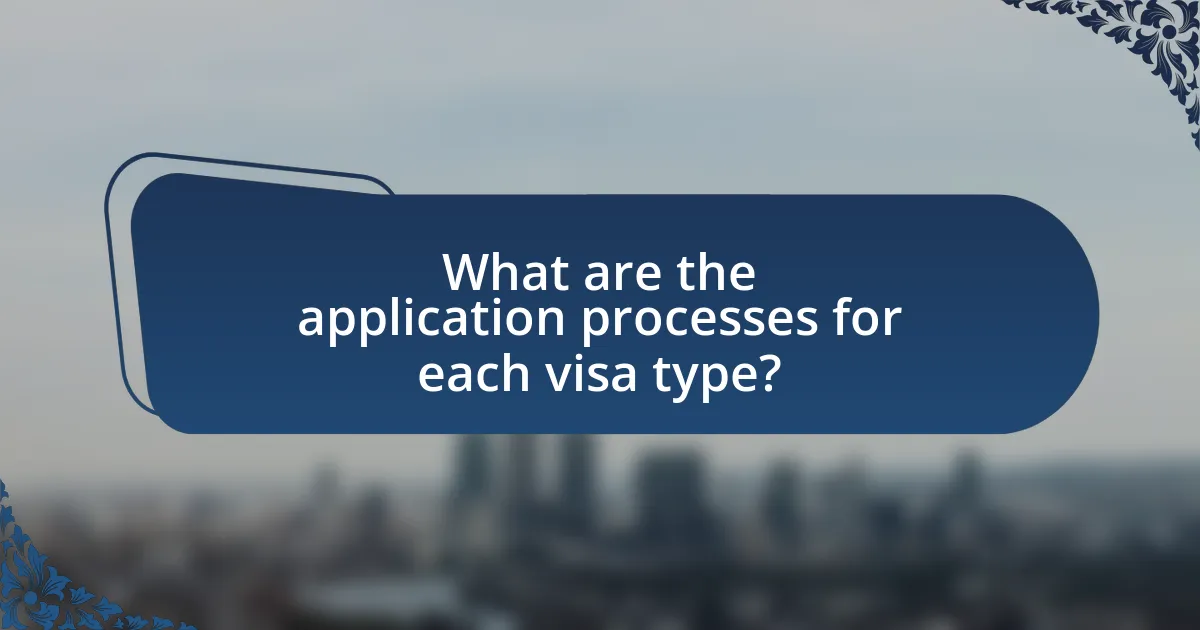
What are the application processes for each visa type?
The application processes for each visa type offered by the Senegal Embassy vary based on the specific visa category. For a tourist visa, applicants must complete a visa application form, provide a valid passport, submit passport-sized photographs, and present proof of accommodation and travel itinerary. For a business visa, the process includes submitting a business invitation letter, proof of business registration, and financial statements. For a student visa, applicants need to provide an acceptance letter from a recognized institution in Senegal, proof of financial means, and a completed application form. Each visa type may also require additional documentation, such as health insurance or police clearance, depending on individual circumstances.
How do I apply for a tourist visa through the Senegal Embassy?
To apply for a tourist visa through the Senegal Embassy, you must complete the visa application form and submit it along with required documents such as a valid passport, passport-sized photographs, proof of accommodation, and a travel itinerary. The Senegal Embassy typically requires these documents to ensure compliance with visa regulations. Additionally, you may need to pay a visa fee, which varies by country. It is advisable to check the specific requirements on the official website of the Senegal Embassy in your country for the most accurate and updated information.
What documents are required for a tourist visa application?
A tourist visa application typically requires a valid passport, a completed visa application form, passport-sized photographs, proof of accommodation, travel itinerary, and evidence of sufficient funds for the duration of the stay. These documents are essential to verify the applicant’s identity, travel plans, and financial capability, ensuring compliance with the visa regulations set by the Senegal Embassy.
What is the typical processing time for a tourist visa?
The typical processing time for a tourist visa is approximately 5 to 10 business days. This timeframe can vary based on the applicant’s nationality and the specific circumstances of the application. For instance, some applications may require additional documentation or verification, which can extend the processing time.
What steps are involved in obtaining a business visa?
To obtain a business visa, applicants must follow several key steps. First, they need to gather required documents, which typically include a valid passport, a completed visa application form, a recent passport-sized photograph, and an invitation letter from a business partner in Senegal. Next, applicants must submit their application and documents to the Senegalese embassy or consulate in their country. After submission, they may need to pay the visa fee and attend an interview if required. Finally, applicants wait for the processing of their visa, which can take several days to weeks, depending on the embassy’s workload and specific requirements.
What documentation is necessary for a business visa application?
A business visa application requires several key documents. These typically include a valid passport with at least six months of validity, a completed visa application form, a recent passport-sized photograph, an invitation letter from a business partner in Senegal, proof of sufficient financial means, and a travel itinerary. Additionally, applicants may need to provide a certificate of incorporation for their business and any relevant tax documents. These requirements ensure that the applicant’s purpose for travel is legitimate and that they have the means to support themselves during their stay.
Are there any specific fees associated with a business visa?
Yes, there are specific fees associated with a business visa. The fees for a business visa to Senegal typically range from $50 to $150, depending on the duration of stay and processing speed. These fees are established by the Senegalese government and can vary based on the applicant’s nationality and the specific requirements of the visa application process.
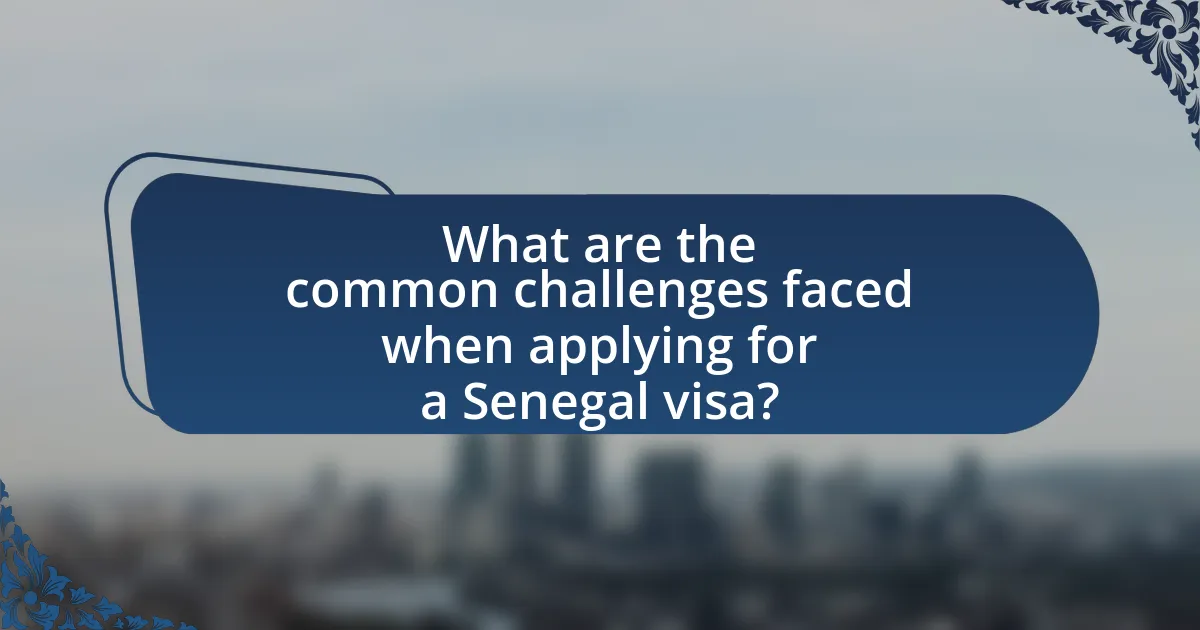
What are the common challenges faced when applying for a Senegal visa?
Common challenges faced when applying for a Senegal visa include incomplete documentation, lengthy processing times, and unclear application procedures. Applicants often struggle with gathering the required documents, such as proof of accommodation, financial means, and travel itineraries, which can lead to delays or rejections. Additionally, the processing time for visas can vary significantly, sometimes taking several weeks, which complicates travel planning. Furthermore, the application process may lack clear guidelines, causing confusion among applicants regarding the necessary steps and requirements.
What mistakes should I avoid during the visa application process?
During the visa application process, you should avoid submitting incomplete or inaccurate information. Incomplete applications can lead to delays or outright denials, as the embassy requires specific documentation and details to process your request. For instance, a study by the U.S. Department of State indicates that nearly 30% of visa applications are rejected due to errors or missing information. Additionally, failing to adhere to the specific requirements for the type of visa you are applying for can result in complications; each visa type has distinct criteria that must be met.
How can incomplete documentation affect my application?
Incomplete documentation can lead to delays or denials in your visa application process. When essential documents are missing, the Senegal Embassy may not be able to assess your eligibility accurately, resulting in a longer processing time or outright rejection. For instance, a study by the International Organization for Migration indicates that incomplete applications are a leading cause of processing delays, with up to 30% of applications facing such issues. Therefore, ensuring that all required documents are submitted is crucial for a smooth application experience.
What are the consequences of applying for the wrong visa type?
Applying for the wrong visa type can lead to significant consequences, including visa denial, delays in travel plans, and potential bans on future visa applications. When an individual submits an application for a visa that does not match their intended purpose—such as applying for a tourist visa instead of a work visa—they may face immediate rejection from the embassy or consulate. This rejection can result in wasted time and resources, as applicants may need to start the application process over again with the correct visa type. Furthermore, repeated applications for incorrect visa types can raise red flags with immigration authorities, potentially leading to longer processing times or even a ban on future applications.
What tips can help ensure a successful visa application?
To ensure a successful visa application, applicants should meticulously prepare all required documentation, including a valid passport, completed application forms, and any supporting materials specific to the visa type. Thoroughly reviewing the Senegal Embassy’s guidelines for the specific visa category is crucial, as each type may have unique requirements. For instance, providing proof of financial stability, travel itinerary, and accommodation details can significantly enhance the application’s credibility. Additionally, submitting the application well in advance of the intended travel date allows for processing time and potential follow-up requests from the embassy.
How can I prepare for a visa interview, if required?
To prepare for a visa interview, gather all required documents, including your passport, visa application form, financial statements, and any supporting documents relevant to your purpose of travel. Familiarize yourself with the specific requirements of the Senegal Embassy, as they may vary based on the visa type. Practice answering common interview questions, such as your travel plans, duration of stay, and financial means, to demonstrate your preparedness and intent. Researching the embassy’s guidelines and understanding the visa process can further enhance your confidence and clarity during the interview.
What resources are available for assistance with the application process?
The Senegal Embassy provides several resources for assistance with the application process, including a dedicated website that outlines visa requirements and procedures. Additionally, applicants can access contact information for embassy staff who can answer specific questions and provide guidance. The embassy may also offer informational brochures and in-person consultations to help navigate the application process effectively. These resources ensure that applicants have the necessary information and support to complete their visa applications accurately.
